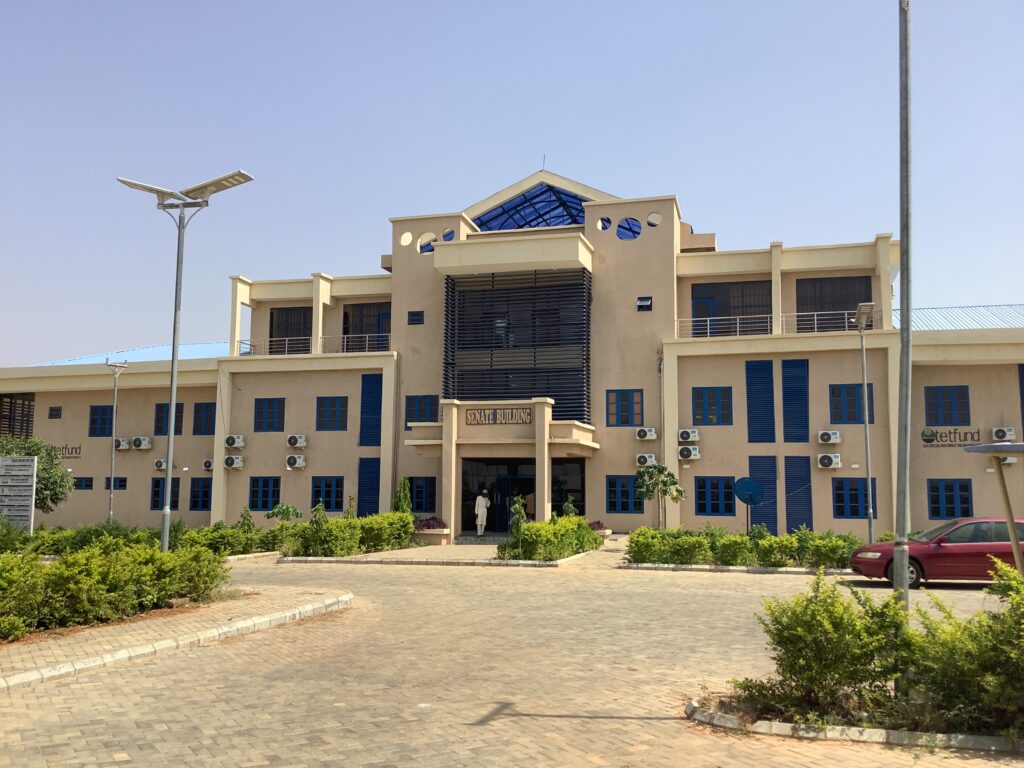The Department of Geography at the Federal University Birnin Kebbi is one of the founding departments of the University, established in 2013. The Department began its academic activities in the 2014/2015 session. It offers a four-year programme leading to a B.Sc. degree in Geography for UTME candidates admitted at the 100 level, and a three-year programme for Direct Entry students who join at the 200 level. The courses are designed to explore the spatial dimensions of physical, economic, social, and political forces that shape human societies and activities. In particular, they examine the interaction of these forces, how they evolve over time, and how they operate at different scales across space. The Department graduated its first cohort of students in 2018. The programme is structured to meet the need for education in both Physical and Human Geography, offering all students, regardless of creed, gender, or political belief, an equal opportunity to acquire the knowledge and skills necessary to contribute to the socio-economic, political, and physical development of society. The mission of the Department of Geography, Federal University Birnin Kebbi, is to enhance the application of spatial knowledge and techniques to foster a sustainable relationship between humans and the environment. The programme aims to equip students with the skills to address and solve geographical issues. The department provide training in both the theory and practice of Geography, with a strong emphasis on field techniques and the use of modern tools. Students are trained to understand the role of Geography in national development by gaining a thorough grasp of geographical concepts and theories, which they can then apply in practical settings.
Programmes

- BSc Geography (Full-time)
- BSc Geography (Part-time)
- PGD Environmental Mgt (Full-time)
- PGD Geographic Info. System
- PhD Geography (Full-time)
Admissions Requirements
Requirements
O level – English, Math, Geography and any two relevant subjects
UTME – English, Geography and any two relevant subjects
Requirements
O level – English, Math, Geography and any two relevant subjects
Direct Entry Candidates: BSc Geography (Full-time) and BSc Geography (Pert-time)
i. O level – English, Math, Geography and any two relevant subjects
ii. An upper credit at National Diploma (ND) Level in which Geography was offered as a course or
any other relevant discipline as approved by the Department. OR Credit at NCE or its equivalent with Geography taken as a course.bOR Three Credits at IJMBE
- Postgraduate
- PGD Environmental Management (Full-time)
- A. Oleve – English, Maths, Geography and any two relevant subjects
- B. Bachelor of Science Degree in relevant disciplines from Federal University Birnin Kebbi or any other recognized institution with a minimum of Third Class degree. iii. Holders Higher National Diploma (HND) with a minimum of Lower Credit pass or equivalent in relevant areas. iv. Holders of a Degree or HND with a minimum of Upper Credit passes in non-related areas may be admitted. v. Candidates who hold qualifications other than the above, which are acceptable to the Board of Postgraduate School and Senate of the University.
- PGD Geographic Information System (Full-time)
- i. Olevel – English, Maths, Geography and any two relevant subjects
- ii. Bachelor of Science Degree in relevant disciplines from Federal University Birnin Kebbi or any other recognized institution with a minimum of Third Class degree. iii. Holders Higher National Diploma (HND) with a minimum of Lower Credit pass or equivalent in relevant areas. iv. Holders of a Degree or HND with a minimum of Upper Credit passes in non-related areas may be admitted. v. Candidates who hold qualifications other than the above, which are acceptable to the Board of Postgraduate School and Senate of the University.
- MSc Geography (Full-time)
- i. Olevel – English, Maths, Geography and any two relevant subjects
- ii. Candidates with Bachelor’s degree in Geography or a relevant field from any recognized university with a minimum of Second Class Honors (lower division). iii. Candidates with a Third Class Division Degree or HND (Minimum of Lower Credit) should have a Postgraduate Diploma from a recognized institution with not less than an Upper credit level in related disciplines.
- PhD Geography (Full-time)
- Olevel – English, Maths, Geography and any two relevant subjects ii. Bachelor’s Degree in Geography from a recognized institution with a minimum of Second Class Honours (lower division).
What you will study
- GST111 – Communication in English
- GST112 – Nigerian Peoples and Culture
- MTH101 – Elementary Mathematics I
- MTH102 – Elementary Mathematics II
- DSS101 – Introduction to Population Studies and Demography
- DSS102 – Introduction to Demography and Social Statistics
- GEO101 – Introduction Physical Geography
- GEO102 – Introduction to Human Geography
- GEO103 – Introduction to Practical Geography
- GEO104 – Local Field Studies
- GEO105 – Introduction to Environmental Science
- GEO106 – Elementary Surveying
- GEO107 – Introduction to Rural-Urban System
- DSS203 – Introduction to Official Statistics I
- GEO201 – Spatial Organization of Society
- GEO209 – Geographical Thought Theory and Methods
- GEO211 – Statistics for Geographers
- GEO212 – Statistics for Geographers
- GEO213 – Regional Geography of Nigeria
- GEO214 – Introduction to Planning and Environmental Management
- GEO215 – Introduction to Meteorology
- GEO216 – Geography of African Development
- GEO217 – Introduction to Geomorphology and Soil
- GEO218 – Air Photo Interpretation and Remote Sensing
- GEO219 – Introduction to Climatology and Biogeography
- GEO220 – Human-Environment Interaction
- GEO221 – Kebbi and its Region
- GEO223 – Introduction to Geographic Information System (GIS)
- GEO224 – Introduction to Cartography And Computer
- GLG207 – Introduction to Petrology
- GST201 – Communication in English II
- GST202 – Logic Philosophy and Human Existence
- GST203 – History and Philosophy of Science
- GST204 – Peace Studies and Conflict Resolution
- GEO301 – Geographical Methodology
- GEO302 – Advanced Quantitative Methods in Geography
- GEO303 – Advanced Quantitative Techniques II
- GEO304 – Regional Geography of Africa
- GEO305 – Field Course
- GEO307 – Geographic Information System
- GEO309 – Biogeography
- GEO311 – Geographical Remote Sensing
- GEO313 – Hydrology
- GEO316 – Applied Climatology
- GEO317 – Vegetation Studies
- GEO318 – Land Evaluation
- GEO319 – Land Administration
- GEO320 – Applied Geomorphology
- GEO321 – Environmental Monitoring and Assessment
- GEO322 – Research Methods
- GEO323 – Cartographic Methods
- GEO324 – Climatology
- GEO325 – Geomorphology
- GEO326 – Fiel and Laboratory Techniques in Geography
- GEO328 – Seminar in Geography
- GEO330 – Population Geography
- GEO331 – Soil Geography
- GEO332 – Settlement Geography
- GEO334 – Economic Geography
- GST301 – Entrepreneurship and Innovation
- GST302 – Venture Creation and Growth
- GEO401 – Contemporary Philosophy and Methodology in Geography
- GEO402 – Contemporary Philosophy and Methodology in Geography II
- GEO403 – Systematic Geography of Nigeria I
- GEO404 – Advanced Cartographic Techniques I
- GEO405 – Advanced Cartographic Techniques II
- GEO406 – Developing World
- GEO407 – The Developed World
- GEO408 – Climate Change and Adaptation
- GEO409 – Demography
- GEO410 – Systematic Geography of Nigeria II
- GEO411 – Kebbi and its Region
- GEO412 – Agricultural Geography
- GEO413 – Medical Geography
- GEO414 – Arid and Semi Arid Lands
- GEO415 – Transportation Geography
- GEO416 – Industrial Geography
- GEO417 – Rural Geography
- GEO418 – Urban Geography
- GEO419 – Ecology of Resources
- GEO420 – Political Geography
- GEO421 – Regional Development and Planning
- GEO422 – Urban Land Economics
- GEO423 – Housing and Environment
- GEO424 – Environment Hazards
- GEO425 – Fluvial Geomorphology
- GEO426 – Soil Survey and Land Evaluation
- GEO427 – Application of Geographic Information System and Remote Sensing
- GEO428 – Water Resources Management
- GEO429 – Migration
- GEO431 – Geography of Tourism
- GEO498 – SIWES
- GEO499 – Research Project
Research Interest
- Climate Change Adaptation, Disaster Risk Reduction, Sustainable Livelihoods
- Population Geography, Demography, Climatology, 4. Institutional based research
- Remote Sensing and GIS, Urban Planning
- Human- Environment interactions
- Hydrology and water resources
- Geoinformatics and Disaster Risk Management
- Climate Sciences and Environmental Management
- Geomorphology and Soil Sciences

DEPARTMENT STAFF
- DR. JAMIL MUHAMMAD

